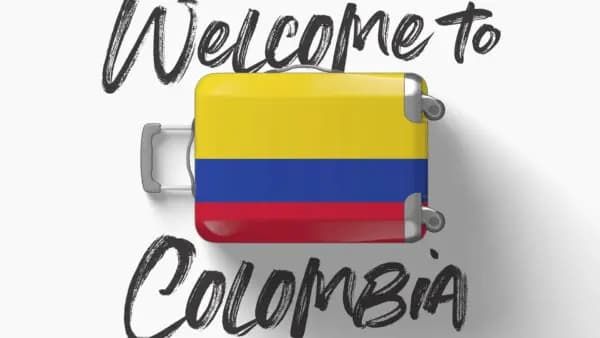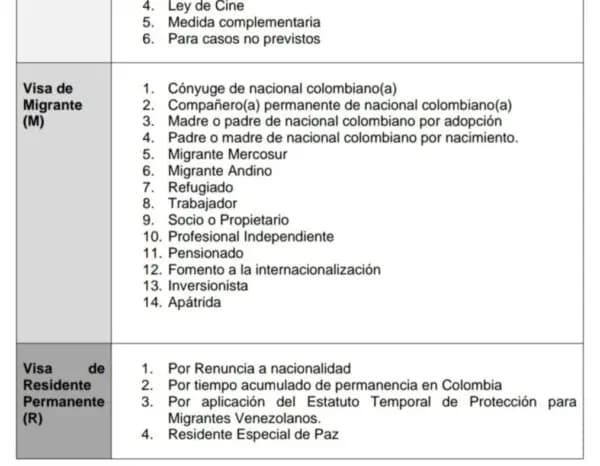Changes in immigration legislation in Colombia

Currently, we can find an immigration reform project on the page of the Colombian Foreign Ministry “Whereby provisions are issued on visas and Resolution 1980 of March 19, 2014 and Resolution 6045 of August 2, 2017 are repealed”.
This draft resolution includes numerous changes in the country’s immigration policy, one of the first of which is that the mere presentation of a visa application does not grant regularity in the national territory and the duration of the study does not add time in the case of applications for Resident visas for accumulated time.
Additionally, foreign citizens will require authorization to enter and remain in Colombian territory, such authorization is expressed through an entry permit or a visa.
If the foreigner is outside Colombia, he/she must submit his/her application through the digital platform, before the Consular Office whose jurisdiction corresponds to his/her own country of residence or that third country where he/she is established with a temporary or permanent residence permit.
Applicants who are in Colombia must submit their application through the digital platform to the visa office in Bogota, which will only hear visa applications from foreigners who are in the country with regular immigration status, the documents required for this process must be digitized and uploaded to the digital platforms provided by the government for these.
Visa categories will also be affected, on the one hand, Visitor visas (type V) would have a total of 25 categories, currently there are only 16. Among these categories for the visitor’s visa we would find Digital Nomads, Entrepreneurs and Remote Workers, but in order to qualify for this type of visa, they will have to provide evidence of a contract with a foreign company for which they provide their services, in addition to proving that they have a minimum income equivalent to three (3) Minimum Legal Monthly Wages in Force (SMLMV).
Migrant visas (type M) would go from having 11 categories to 14, among the most central changes we find would be the displacement of the investor visa for direct investment, which will no longer be able to apply directly to a Resident visa despite making an investment of more than 650 SMLMV, but will enter into the category of Migrant visas; the incorporation of visas of the Andean Statute For nationals of any of the States parties to the “Andean Migratory Statute”; distinguishing between the spouse visa and the permanent partner visa; the visa for the promotion of internationalization, for foreigners with training in the field of master’s, doctorate or post-doctorate in basic or applied sciences, engineering, etc., whose profiles fit the priorities required by the country.
In the case of Permanent Resident visas, this would be reduced from 7 categories to 4 in order to be eligible for permanent residence, a minimum time in the national territory holding a type M visa would be required, this time would oscillate between 2 and 5 years.
These articles include modifications to the Permanent Companion visa, which is now included in the M type visas and not in the R type. Likewise, the R category for the father or mother of Colombian nationals is excluded, and the R visa for Venezuelan nationals under the Temporary Protection Statute is also incorporated and regulated.


Another relevant aspect to be pointed out is that foreigners of those nationalities not exempted from short stay visa determined by resolution, who have entered with a type V visa, will not be able to request the change of visa type to Migrant or Permanent Resident (R) within the national territory; they will have to carry out this procedure from outside the national territory.
By way of conclusion it is necessary to remember that this is a mere draft resolution, the final version will be subject to modifications, but it seems that the essence of the draft resolution will be maintained, this because the previous draft resolution “Whereby provisions on visas are issued, Resolution 6045 of August 2, 2017 and Resolution 1980 of March 19, 2014 are repealed” which was socialized on February 8, 2019, was quite similar, maintaining this restrictive line that hinders entry to Colombia.
Both in the 2019 draft and in the new text of the immigration reform project, they prefer to opt for a more severe legislation that in general makes it more difficult for foreigners to enter, thus causing a greater bureaucratization in the visa process in Colombia.
You can review the complete draft resolution at the following link if you wish to inquire further.
Recommended articles
Would you like some advice?
Please fill out the following form, and we will get in touch with you.
- Phone:300 388 4986
- WhatsApp:Click to start your WhatsApp chat
